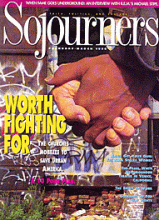The involvement of the black church as a social institution (as well as its clergy) in the activities of the modern civil rights movement is well-documented: Most people are familiar with such congregations as Ebenezer Baptist Church, Dexter Avenue Baptist Church, Abyssinian Baptist Church, Mother Bethel African Methodist Episcopal Church, Metropolitan African Methodist Episcopal Church; and pastors like Leon H. Sullivan, Ralph Abernathy, Joseph Lowery, and Martin L. King Jr.
We have heard relatively little, however, from or about those African-American clergy who were active within predominantly white ecclesiastic structures. Paul Washington is/was just such a clergyperson, and his denomination, the Episcopal Church, is most definitely acknowledged to be a white organization.
Nevertheless, the Episcopal Church - specifically the congregation of the Church of the Advocate in North Philadelphia - served as the place of strategy and shelter for such civil rights activist groups as the Student Nonviolent Coordinating Committee, the Black Power Movement, the Black Panther Party, the Black Economic Development Conference, the Congress of Racial Equality, Philadelphians for Equal Justice, and a host of others challenging the social inequities of our nation. It was also from the Church of the Advocate that Right Rev. Barbara Harris was called to become the first African-American female bishop of the Episcopal Church U.S.A., and the first in the history of the Anglican Communion. This book, Father Paul Washington of the Church of the Advocate: An Autobiography reveals the story of an African-American man who, born and raised in Charleston, South Carolina, served as pastor of the Advocate for 25 years.
The quiet strength of this autobiography magnetically draws the reader into the reflective thinking of a man deeply devoted to his faith and unabashedly
Read the Full Article
